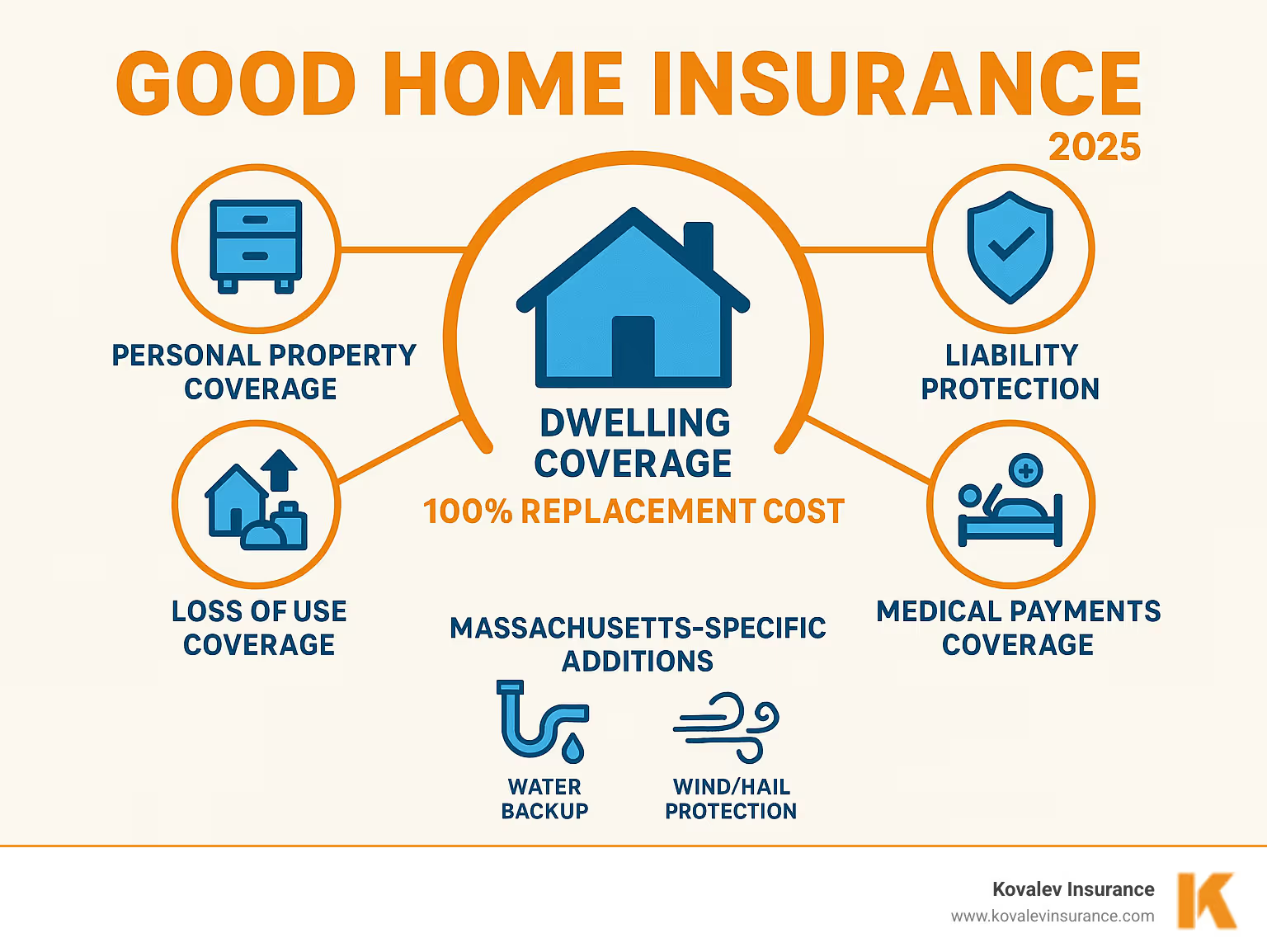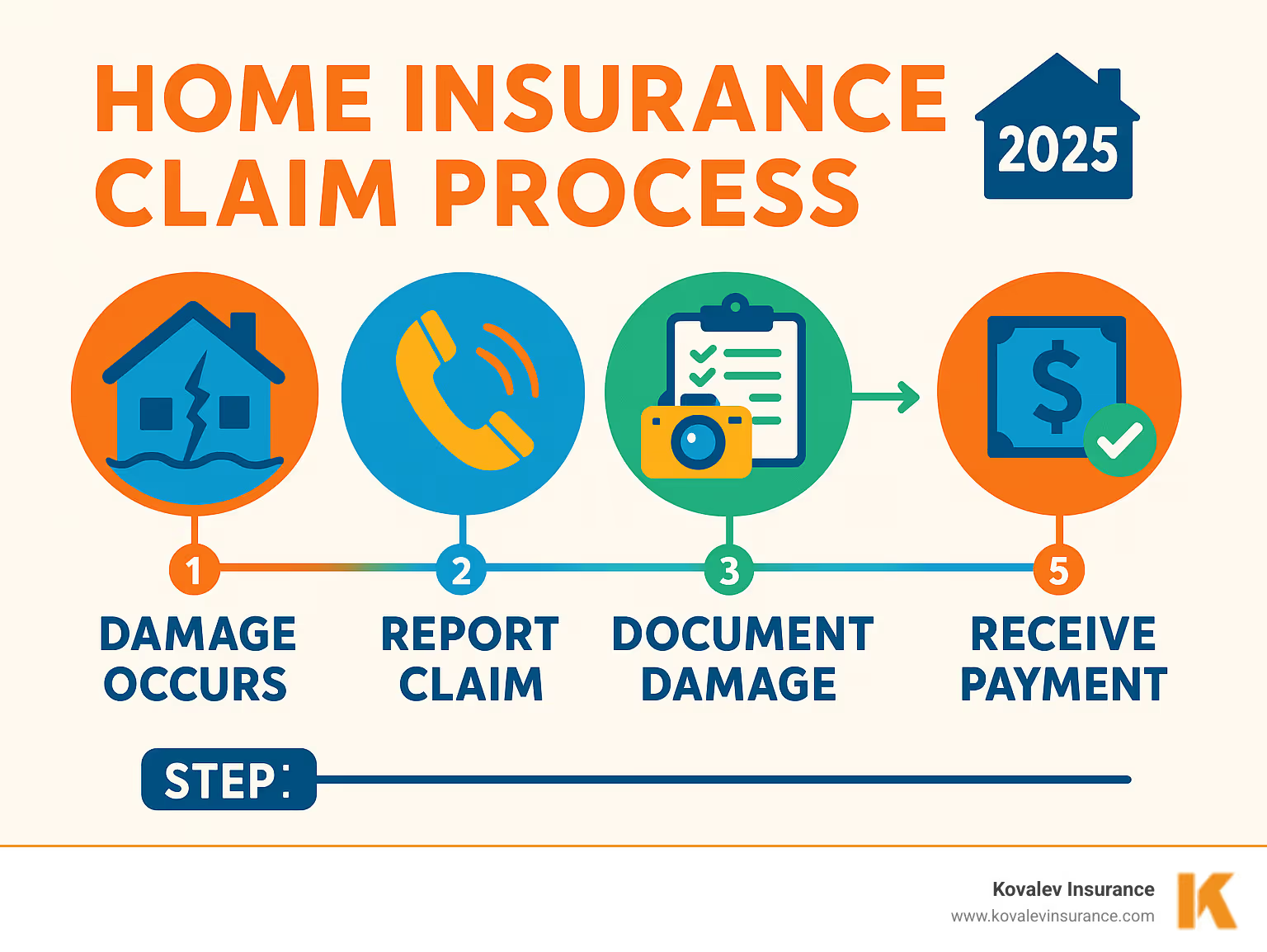Blog Content
8
Jul
2025

Good home insurance protects your biggest investment while giving you peace of mind. But with dozens of companies and countless coverage options, finding the right policy can feel overwhelming.
Top indicators of good home insurance in Massachusetts:
The average Massachusetts homeowner pays about $1,200-$1,800 annually for home insurance, but rates vary significantly by location. Newton and Wellesley residents often pay more due to higher property values, while areas like Natick and Belmont may see lower premiums.
What separates good home insurance from mediocre coverage? It's not just about price. Good policies combine comprehensive protection with reliable claim service and financial stability. They also include Massachusetts-specific endorsements for weather risks that are common in our region.
I'm Mikhail Kovalev, and I've helped thousands of Massachusetts homeowners find good home insurance that actually protects them when disasters strike. Over the past decade building Kovalev Insurance Agency, I've seen how the right coverage makes all the difference during stressful claim situations.

Key good home insurance vocabulary:
Finding good home insurance in Massachusetts means understanding what truly protects your home versus what just looks good on paper. The foundation of quality coverage starts with replacement cost protection for your dwelling - not just the market value of your property.
Here's why this matters: Your charming colonial in Newton might be worth $800,000 on today's market, but rebuilding it from scratch could cost $1.2 million due to current construction costs and building codes. Good home insurance covers that full replacement cost, so you're not stuck with a massive bill if disaster strikes.
The 80% rule plays a crucial role in how your coverage works. Insurance companies require you to carry at least 80% of your home's replacement cost to avoid coinsurance penalties. If your home needs $500,000 to rebuild, you'll need at least $400,000 in dwelling coverage. Fall short of this threshold, and you'll end up paying part of every claim out of your own pocket - even small ones.
Massachusetts homeowners face weather challenges that make certain coverage features essential rather than optional. Our nor'easters, coastal storms, and brutal winters create risks that standard policies might not fully address.
Dwelling coverage protects your home's structure, including everything permanently attached like built-in appliances, cabinets, and fixtures. In Massachusetts, where construction costs keep climbing, make sure your dwelling coverage includes automatic inflation protection.
Other structures coverage handles detached buildings on your property - garages, sheds, fences, and those beautiful gazebos common in Needham and Natick. Most policies automatically provide 10% of your dwelling coverage for other structures.
Your belongings inside the home get protection through personal property coverage. Good home insurance offers replacement cost coverage for your stuff, not actual cash value. This means when your laptop gets stolen, you receive enough money to buy a new one rather than what your old one was worth after depreciation.
Loss of use coverage becomes your lifeline when your home is uninhabitable due to covered damage. This pays for hotel stays, restaurant meals, and other additional living expenses beyond your normal costs. Given Massachusetts' high cost of living, especially around Boston, adequate loss of use coverage prevents financial stress during an already difficult time.
Medical payments coverage handles small medical bills for guests injured on your property, regardless of who's at fault. While typically limited to $1,000-$5,000, this coverage can prevent minor accidents from turning into major legal headaches.
Nor'easters deserve special attention in any good home insurance discussion. These powerful storms dump heavy snow while packing strong winds that can damage roofs, knock out power for days, and create dangerous ice dams. Quality policies specifically address these weather events without surprise exclusions.
Hurricane wind damage affects not just coastal areas but can reach inland communities too. While we don't face Florida-level hurricane risks, storms like Hurricane Bob and Hurricane Sandy proved Massachusetts isn't immune.
Ice dams form when snow melts and refreezes at your roof's edge, potentially sending water into your home's interior. This common Massachusetts problem requires specific coverage language since some insurers exclude ice dam damage or severely limit what they'll pay.
Sump pump backup coverage protects against basement flooding when drainage systems get overwhelmed. With our heavy spring rains and dramatic snowmelt, this endorsement is crucial for homes with basements, especially in areas like Newton and Belmont where older infrastructure struggles with heavy water flow.
Mold coverage becomes important when water damage isn't addressed quickly. Massachusetts' humid summers create perfect conditions for mold growth, making this protection valuable for complete peace of mind after any water-related claim.

Shopping for good home insurance doesn't have to drive you crazy if you know what to look for. The secret to smart shopping is comparing apples to apples - identical coverage limits, same deductibles, and same endorsements across different insurers.
Independent agents like us offer a huge advantage over online quote tools or captive agents who only sell one company's products. We can pull quotes from multiple insurers and actually explain what you're getting. Those online tools might give you a quick number, but they often miss important coverage details or available discounts.
The NAIC complaint index tells you how often customers file complaints against insurers compared to their market share. A lower number means better customer service and smoother claims handling. You can find this data at the NAIC complaint data website.
Here's how different coverage scenarios affect your premium in Massachusetts:
Notice how the premium doesn't double when coverage increases significantly? That's because good home insurance pricing isn't always linear.
A truly good deal isn't just about finding the cheapest premium - it's about getting the best value for your protection dollar. I've seen too many Newton and Wellesley homeowners choose the lowest price only to find their "bargain" policy had major gaps when they needed it most.
The premium versus deductible relationship is where you can make smart moves. Raising your deductible from $500 to $1,000 typically reduces your premium by 10-15%. Jump to $2,500 and you might save 20-25%. Just make sure you can actually afford that higher deductible if you need to file a claim.
Multi-policy credits for bundling home and auto insurance can save 10-25% on your total premiums. We often find that bundling gives you better overall value even if one policy costs slightly more individually.
Your credit score plays a bigger role than most people realize. Massachusetts insurers use credit-based insurance scores to predict claim likelihood. Maintaining good credit can literally save you hundreds of dollars annually on your premiums.
The 80% rule is probably the most misunderstood concept in home insurance, but it's crucial for good home insurance coverage. You need to insure your home for at least 80% of its replacement cost to avoid coinsurance penalties. Miss this mark, and you'll pay part of every claim out of your own pocket.
Here's where many Brookline and Needham homeowners get tripped up: they use their home's market value or what they paid for it instead of replacement cost. These numbers can be wildly different, especially for older homes or in areas where land values are high.
Coinsurance penalties are harsh but fair. If your home needs $500,000 to rebuild but you only carry $300,000 in coverage (60%), you'll pay 25% of any claim yourself, even for partial losses.
Rebuild calculators help estimate replacement costs, but they're not perfect. They consider square footage, construction type, and local building costs in Massachusetts, but they might miss unique features or expensive finishes. For high-value homes in Newton or Wellesley, a professional appraisal gives you more accurate numbers.
Dwelling inflation guard automatically bumps up your coverage limits each year to keep pace with construction cost inflation. With building materials costs jumping 10-15% annually in recent years, this endorsement is essential.

Want to save money on your good home insurance without sacrificing protection? The secret isn't cutting corners - it's making smart choices that actually reduce your risk while lowering your premiums.
Higher deductibles offer the fastest path to premium savings. When you increase your deductible from $1,000 to $2,500, you'll typically see your premiums drop by 15-20%. For a Newton homeowner paying $1,500 annually, that's $225-$300 back in your pocket every year.
Security devices do more than protect your home - they protect your wallet too. A monitored burglar alarm can slash your premiums by 5-15%, while smoke detectors and fire extinguishers add additional savings. Smart home devices like water leak sensors and security cameras are increasingly earning discounts as insurers recognize how they prevent losses.
Flood insurance isn't included in your regular homeowners policy. Even if you live in low-risk Wellesley or Brookline, you still need separate flood coverage. Twenty-five percent of flood claims actually occur in areas considered low-risk. The median flood insurance premium runs about $688 annually.
Umbrella insurance might sound fancy, but it's actually one of the best insurance bargains available. A $1 million umbrella policy typically costs just $200-$400 per year and provides crucial protection against large liability claims.
Inflation guard endorsements automatically adjust your limits annually so you don't have to worry about falling behind on replacement costs. Given how building materials prices have surged recently, this endorsement has become essential.
Water backup coverage protects against one of the most common - and expensive - problems Massachusetts homeowners face. Your standard policy won't cover sewer and drain backups, which can cause thousands in damage. This is especially important in communities like Newton and Natick where older infrastructure struggles during heavy spring rains.
Equipment breakdown coverage saves you when your expensive home systems fail. Your HVAC unit, water heater, or built-in appliances can break down from mechanical issues that aren't covered under standard policies.
Ordinance or law coverage becomes crucial when you're rebuilding an older home. If your 1950s Belmont colonial suffers major damage, current building codes might require expensive upgrades during reconstruction. This coverage pays the additional cost to bring your home up to current standards.
Identity theft coverage might seem out of place in a homeowners policy, but it provides valuable protection in our digital world. Beyond protecting your home, this coverage helps restore your identity and covers expenses when identity thieves strike.
Impact-resistant roofing does double duty - it protects your home from Massachusetts' harsh weather while cutting your insurance costs. These materials stand up better to hail damage and high winds from nor'easters, often earning 10-20% premium discounts.
Plumbing upgrades address one of the biggest sources of homeowners claims. Replacing old galvanized pipes with modern copper or PEX piping reduces water damage risk and can qualify for discounts. Given how many Needham and Wellesley homes still have older plumbing systems, these upgrades make both financial and practical sense.
Smart leak sensors represent the future of loss prevention. These devices detect water problems early and can automatically shut off your water supply when leaks occur. They connect to your smartphone, alerting you immediately to potential problems. Some insurers now offer discounts for installing these systems.
Scientific research on building materials costs

Good home insurance proves its value when you need to file a claim. Proper preparation and understanding the process helps ensure fair claim settlements and faster resolution.
Home inventory documentation is crucial for personal property claims. Photograph or video your belongings, noting serial numbers, purchase dates, and values. Store this inventory safely off-site or in cloud storage.
Photo evidence of damage should be comprehensive but safe to obtain. Document damage from multiple angles before making temporary repairs. However, don't risk injury by climbing on damaged roofs or entering unsafe areas.
Additional Living Expense (ALE) receipts must be saved if your home becomes uninhabitable. Keep receipts for hotels, meals, and other expenses above your normal living costs. Most policies require receipts for reimbursement.
Massachusetts FAIR Plan serves as a backup option when standard insurers won't provide coverage. This state-mandated program ensures availability of basic coverage for high-risk properties, though coverage is limited and expensive.
More info about home inventory
Report damage immediately to your insurer, even if you're unsure whether damage is covered. Most insurers have 24/7 claim reporting hotlines. Prompt reporting prevents disputes about when damage occurred.
Contact your agent as soon as possible after reporting the claim. We can guide you through the process, help communicate with the insurer, and advocate for fair treatment. Independent agents work for you, not the insurance company.
Adjuster visits typically occur within 24-48 hours for urgent claims. Be present during the inspection if possible, and point out all damage. Adjusters are thorough but may miss damage that isn't immediately obvious.
Repair approval processes vary by insurer and claim size. Some insurers require pre-approval for repairs, while others allow immediate action for emergency repairs. Understand your policy's requirements to avoid coverage disputes.
Payment timelines in Massachusetts are regulated by state law. Insurers must pay undisputed claims within 30 days of receiving required documentation.
Nonrenewal notices require immediate action. You have 45 days to find replacement coverage, which sounds like plenty of time but can pass quickly, especially if you have claims history or other complicating factors.
Mitigation fixes can sometimes prevent nonrenewal. If your insurer cites specific concerns like old wiring or roof condition, addressing these issues may convince them to renew your policy or help you find coverage elsewhere.
Massachusetts FAIR Plan provides basic coverage when standard insurers won't write policies. Coverage is limited to dwelling and personal property, with minimal liability protection. Premiums are typically higher than standard market rates.
Agent shopping help becomes invaluable when facing nonrenewal. Independent agents have relationships with multiple insurers and understand which companies accept higher-risk properties.
Most Massachusetts homeowners can expect to pay between $1,200 and $1,800 annually for good home insurance, though your actual cost depends on several important factors. If you live in Newton or Wellesley, you'll likely see premiums ranging from $1,500 to $2,500 due to higher property values and replacement costs. Meanwhile, homeowners in Natick and Belmont often enjoy more moderate premiums between $1,000 and $1,500.
Your home's value and replacement cost plays the biggest role in determining your premium. A $400,000 home costs significantly less to insure than a $800,000 property, simply because there's more at risk.
Location within Massachusetts creates surprising premium differences. Coastal areas face higher rates due to storm risks, while neighborhoods with higher crime rates also see increased premiums.
Your claims history follows you from insurer to insurer. If you've filed multiple claims in recent years, expect higher premiums. Conversely, claim-free homeowners often qualify for substantial discounts that can reduce costs by 20% or more.
Credit scores significantly impact home insurance premiums in Massachusetts. Insurers use credit-based insurance scores to predict claim likelihood. Maintaining good credit can save you hundreds of dollars annually.
Finally, your deductible choice directly affects your premium. Choosing a $2,500 deductible instead of $1,000 can reduce your annual premium by 15-20%. Just make sure you can comfortably afford the higher out-of-pocket cost if you need to file a claim.
Massachusetts doesn't legally require homeowners insurance, but here's the reality: if you have a mortgage, you absolutely must carry coverage. Every mortgage lender in Newton, Wellesley, Brookline, and surrounding communities requires good home insurance as a condition of your loan.
Your lender typically requires dwelling coverage equal to your loan amount or the home's full replacement cost, whichever is higher. They'll also want liability coverage of at least $100,000, though we strongly recommend $300,000 to $500,000 for better protection.
Even if you own your home outright, good home insurance remains essential financial protection. Consider this: could you afford to rebuild your entire home and replace all your belongings after a fire? Most people can't write a check for $400,000 to $600,000 without serious financial hardship.
Beyond the financial protection, there's genuine peace of mind in knowing you're covered. When that nor'easter knocks a tree through your roof or a kitchen fire damages multiple rooms, you'll sleep better knowing your insurance will handle the repairs and temporary housing costs.
We recommend reviewing your home insurance coverage annually and actively shopping for new quotes every two to three years. Insurance rates change frequently, and you might qualify for new discounts or find better coverage options with different insurers.
Shop immediately if your premium jumps more than 10% at renewal without explanation. Also shop if you've made significant home improvements like a new roof, updated electrical system, or finished basement - these changes can qualify you for discounts or require coverage adjustments.
Life changes trigger shopping needs too. Marriage, divorce, or having children can affect your insurance needs and available discounts. If you haven't shopped in more than three years, you're probably overdue for a market comparison.
Your annual review should include confirming adequate dwelling coverage limits as construction costs rise. Update your personal property inventory after major purchases, and review available discounts you might have missed.
Many of our clients set calendar reminders each year to review their coverage. This simple habit ensures they maintain adequate protection as their needs evolve and helps them catch potential savings opportunities.
Finding good home insurance in Massachusetts becomes much simpler when you know what matters most. It's not just about getting the cheapest quote - it's about finding coverage that will actually protect your home and family when you need it most.
Good home insurance starts with replacement cost coverage for both your home and belongings. Add solid liability protection of at least $300,000, plus those Massachusetts-specific endorsements we talked about for ice dams, water backup, and storm damage. Most importantly, choose an insurer with strong financials and a track record of treating customers fairly during claims.
After helping thousands of families in Newton, Wellesley, Brookline, Needham, Belmont, and Natick find the right coverage, I've learned that the best policies combine comprehensive protection with reasonable premiums. But here's the thing - what works for your neighbor might not work for you.
That's where local expertise makes all the difference. We understand that a historic home in Brookline faces different risks than a newer construction in Natick. Coastal properties in parts of our service area need different protection than inland homes. These details matter when you're filing a claim.
As an independent agency, we work with multiple top-rated insurers. This means we can compare your options side-by-side and find the coverage that fits your specific situation and budget. No pressure, no confusing jargon - just honest advice about what you actually need.
Ready to find good home insurance that makes sense for your Massachusetts home? Give us a call for a no-obligation review of your current coverage. We'll show you exactly what you're getting, explain any gaps, and provide personalized quotes from several insurers.
More info about how to buy home insurance
The best time to review your home insurance is before you need it. Don't wait for a storm or break-in to find your coverage isn't what you thought. Let's make sure your good home insurance truly protects what matters most to you and your family.
X